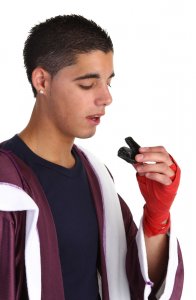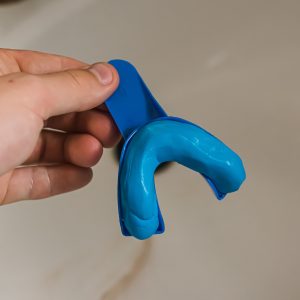A kid mouth guard can protect your child's teeth, whether they grind their teeth at night or play contact sports. Not every mouth guard is the same, as some are designed specifically for sports while others are meant to only be worn while sleeping, although for children this is less common.
In this guide, we'll go over everything you need to know about children's mouth guards, including:
- Children's mouth guards for grinding teeth
- Sports and football mouth guards for kids
- Types of kids mouth guards
- Kids night guards
- …and more!
We hope this information helps you find the best youth mouth guard for your child so they can have healthy teeth for the rest of their lives.
In This Article
What is a kids mouth guard?
Mouth guards are plastic devices that fit around your teeth to protect them. What they protect your teeth from depends on their purpose, but there are two main reasons why your child may need a mouth guard – a mouth guard for sleeping (also called a night guard) and a mouth guard for playing sports. We'll talk about the differences of these more further down.
Mouth guards can also be used to protect your child's tongue and soft tissue from trauma as well. Your child's dentist or doctor may recommend that they wear a mouth guard for the following reasons, including:
- Grinding their teeth at night
- Playing contact sports like football, basketball, or hockey where they may be hit in the face
- Playing non-contact sports where the risk for falling is high, like gymnastics or mountain biking
Uses for children's mouth guards
As mentioned above, there are different reasons why your child may need to wear a mouthguard, including mouth guards for TMJ relief, protecting a child's teeth who has epilepsy, or even as a supplement for some teeth straightening procedures.

But the two principal reasons why your kid may need to wear a mouth guard are if they grind their teeth at night while they sleep (less common), or if they need to protect their teeth while playing sports that have a high risk of being hit in the face or falling. Let's have a closer look at those reasons now.
Night guard for kids
Children's mouth guards for grinding teeth are worn at night to protect teeth from damage caused by jaw clenching or tooth grinding. Teeth grinding is not all that uncommon in children. Just like with adults, it is usually done unconsciously while your child sleeps, ad it is associated with psychological factors such as stress or anxiety.
Some teeth grinding won't necessarily be a problem because children might actually grow out of it by the time they reach adolescence. However, severe teeth grinding that isn't relieved by simple lifestyle changes should be addressed with your pediatric dentist. If not, children could damage their permanent teeth.
That being said, teeth grinding guards for kids are not often recommended. Because a child's mouth and jaw grow and change so quickly, wearing a night guard every night can actually have an adverse effect on the growth of new teeth and the development of the jaw.
However, you should consult with your child's dentist if they grind their teeth at night. Some of the stress-relief lifestyle changes they may recommend include:
- Ensuring your child drinks plenty of water throughout the day
- Avoiding the use of electronics two hours before they go to bed
- Engaging in relaxing activities before sleep, like a warm bath or reading a book
- Implementing a gentle children's yoga routine before bedtime
- Talking with your child about what might be causing their anxiety
Children's sports mouth guard
Kids' mouth guards for sports are worn during the day, usually only when a child is practicing sports or participating in other activities where their teeth are at risk of being damaged.

While mouth guards may not seem like they do much, they actually play a large role in protecting your child's teeth. However, researchers have estimated that 13% of oral trauma cases in children are due to sports activities.
They help prevent teeth from chipping, breaking, or being knocked out. And if your child has braces, they can also protect the brackets and wires from being damaged.
While the most obvious benefit of mouth guards is protecting teeth, they also are important for protecting the gums, lips, and jaw. Mouthguards can stop children from biting their lip or tongue if they are tackled, potentially preventing extreme pain and a trip to the hospital, or even worse, permanent scarring.
As opposed to night guards, mouth guards are used based on the type of activity in a particular sport or individual characteristics that might predispose an individual to injuries. For instance, mouth guards are are often recommended for children who play high-contact sports or those with a high risk of falling down. It can protect their new permanent teeth from irreversible damage.
It's important for your child's mouthguard to fit well; if it doesn't the guard could actually cause harm. And large chunky plastic guards could cause your child to gag or hurt their soft tissue.
Mouth guards for kids for sports should reach all the way back to their molars, but without touching the soft palate, which can cause the gag reflex. But, if a mouthguard doesn't go far enough back, it won't provide proper protection for their jaw or teeth.
All of these factors, including the reach of the guard, its thickness, and how it's fitted to your child's mouth will affect the level of protection and comfort it provides. That's why you should consult with your child's dentist before getting a mouth guard, as they will likely recommend or prescribe a custom-made guard made specifically for your child's teeth.
While custom sports guards are more expensive than over-the-counter options, they will likely cost less than fixing an expensive dental injury.
Types of mouth guards for kids
There are various types of mouth guards for kids, but you should always consult your child's dentist or doctor before giving your child a mouth guard to wear. Not doing so could result in permanent damage to the development of your children's teeth or jaw.
Custom child mouth guards

Custom mouth guards are by far the best mouth guard for kids as they are prescribed by a dentist and made to fit your children's mouth perfectly. If your child's dentist recommends a custom nightguard, chances are you'll have to switch it out often, as your child's mouth grows and changes.
If your child does get a custom mouthguard, their dentist will use an impression of their teeth to tailor a mouthguard according to the child’s needs and for a comfortable fit. These mouth guards are the most expensive type, but they offer the best fit and the highest level of protection.
They are made specifically for your child's mouth, and for their needs, whether for use at night to protect against teeth grinding or for protection during athletic activities.
Adjustable children's mouth guard
An adjustable mouthguard can be reshaped as needed, either because it is made of a flexible material due to a design that includes sliding or adjustable pieces, or because by placing it in warm water the plastic softens and it can be re-molded when it becomes distorted or loose. This category includes boil-and-bite and shell-liner mouth guards.
Boil-and-bite kids mouth guard
These mouth guards can be purchased over the counter and are made of a thermoplastic material.
To fit them, you soften the plastic by placing it in hot water, then put the mouthguard in your child's mouth and gently press the guard around their teeth until it is in the right position. Your child will bite down for around 20 seconds. You then run the guard under cool water so it keeps its form.
Shell-liner mouthguard
It includes a pre-formed outer shell made of polyvinyl chloride and a liner made of plasticized acrylic gel or silicone rubber. The shell fits roughly to the upper teeth. The liner is placed in the shell and molds to the teeth. It then takes on a permanent shape by a thermal or chemical process.
One-size-fits-all youth mouthguards
These mouth guards are usually the least optimal solution, as they aren't customized to your child's mouth at all. They are all one size and the idea is you just buy them hoping they will fit. You might experience pain after wearing mouth guards that are one-size-fits-all. They are bulky and usually interfere with talking and breathing.
How to know if your child needs a mouth guard
There are various ways to tell if your child needs a mouth guard. However, indicators will be different, depending on if it's for sleeping or for protecting teeth during sports.
Does my child need a mouth guard for sports?
In general, if your child is playing any type of contact sport, including football, boxing, hockey, soccer, and basketball, they should wear a mouthguard to protect their teeth and gums. In fact, many dentists will recommend mouth guards for non-contact sports as well, or other activities like mountain biking or skateboarding.
Mouth guards will protect the soft tissue in your child's mouth, as well as their tongue, lips, and teeth.
Dentists generally recommend mouthguards for kids who play high contact sports, including:

- Football
- Hockey
- Lacrosse
- Soccer
- Rugby
- Basketball
- Wrestling
- Boxing
Does my child need a night guard?
It's less likely that your child's dentist will recommend a night guard for children. This is for a couple of reasons — first, children often grind their teeth as their mouths develop. However, they may grow out of the habit once they reach adolescence. The other reason is that a night guard could actually do more harm than good.
Your child's teeth, jaw, and mouth are developing quickly, all the time. A children's night guard worn during sleep could actually inhibit proper growth and development, leading to lifelong and irreversible problems. That's why it's essential to consult with a dentist or doctor before giving your child a night guard.
All of that being said, you should still keep an eye out for the symptoms of teeth grinding. These can include:
- Chronic, dull headaches
- Sore jaw
- Painful or loose permanent teeth
- Cracked or damaged teeth
There are some cases when your child's dentist will recommend a night guard. It will most likely be a prescription, custom-fit guard.
Mouth guards for teenagers
Just like with younger kids, teenagers should wear mouthguards while playing contact sports. In fact, you should too, no matter what your age!
However, unlike younger children, once a teenager has all of their adult teeth in place, they've finished with braces, and their jaw has stopped developing, it becomes safer for the most part for them to wear a night guard at night if they continue to grind their teeth. Any teeth grinding in teenagers should also be talked about with their dentist or doctor.
Conclusion
Kids' sports mouth guards are often recommended by dentists to protect your child's teeth, tongue, and gums from being hit, bitten, or damaged. They can be extremely beneficial in ensuring that your child's teeth and mouth fully develop. They also are an important step in helping your child have healthy teeth for the rest of their life.
Nightguards are used to protect teeth from the adverse effects of teeth grinding. While often recommended for adults or older teens, night mouth guards for children are less common, as they can actually inhibit a child's jaw and teeth from forming properly.
If your child plays sports or grinds their teeth, speak with their dentist about a mouth guard for protection. Take time to discuss strategies for reducing nighttime teeth grinding as well.
Warrpda.org: Does my child need a night guard? Consulted 2nd November 2021.




